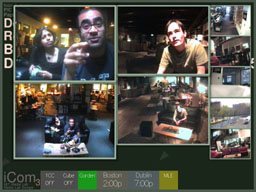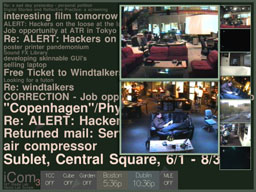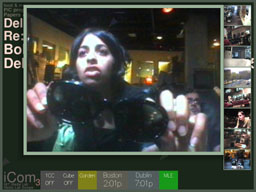|
Media Lab
Europe Human Connectedness research group iCom a multipoint awareness and communication portal for connecting remote social spaces Stefan Agamanolis iCom is a media installation that forms a bridge between different locations. It operates in a continuous and background mode, integrated with the surrounding space. The portal enables awareness of remote activity and promotes a sense of connection among those generating it -- be they colleagues, family members, or friends in distant lands.
iCom connects several sites at Media Lab Europe and the MIT Media Lab 24 hours a day. Its normal mode is background, providing continuous ambient awareness between all stations, but at any time it can be transformed into a foreground mode for ad-hoc tele-meetings or casual interaction, without the need to dial telephones or wait for connections to be established. The screen projections at each site are synchronized, enchancing a sense of shared space and reciprocity. In addition, nothing is recorded or displayed outside of the iCom stations. If you can't see yourself on the screen, then you know others can't see you either.
iCom also functions as a bulletin board for community messages or announcements, sent via email. Clicking on a message title causes its full text to be displayed. The titles are listed in chronological order with varying size to reflect the age and popularity of a posting.
The system conserves bandwidth by reducing frame rate where no activity is detected and by not transmitting audio when nobody is speaking. Clicking the windows changes their arrangement, allowing the display to be customized for a particular activity. Transmitted resolution is adjusted to reflect the size of the window. Use of connectionless networking protocols enables the system to operate effectively in congested or problematic networks. Echo-cancelling speaker/microphones enable full duplex speech transmission. Audio at each site can be turned on and off by clicking its corresponding indicator box at the bottom of the screen. This project is being conducted in association with the Object-Based Media group at the MIT Media Lab. Publications and Links
iCom is discussed in:
|



